Boyle J.A. The Cambridge History of Iran, Volume 5: The Saljuq and Mongol Periods
Подождите немного. Документ загружается.

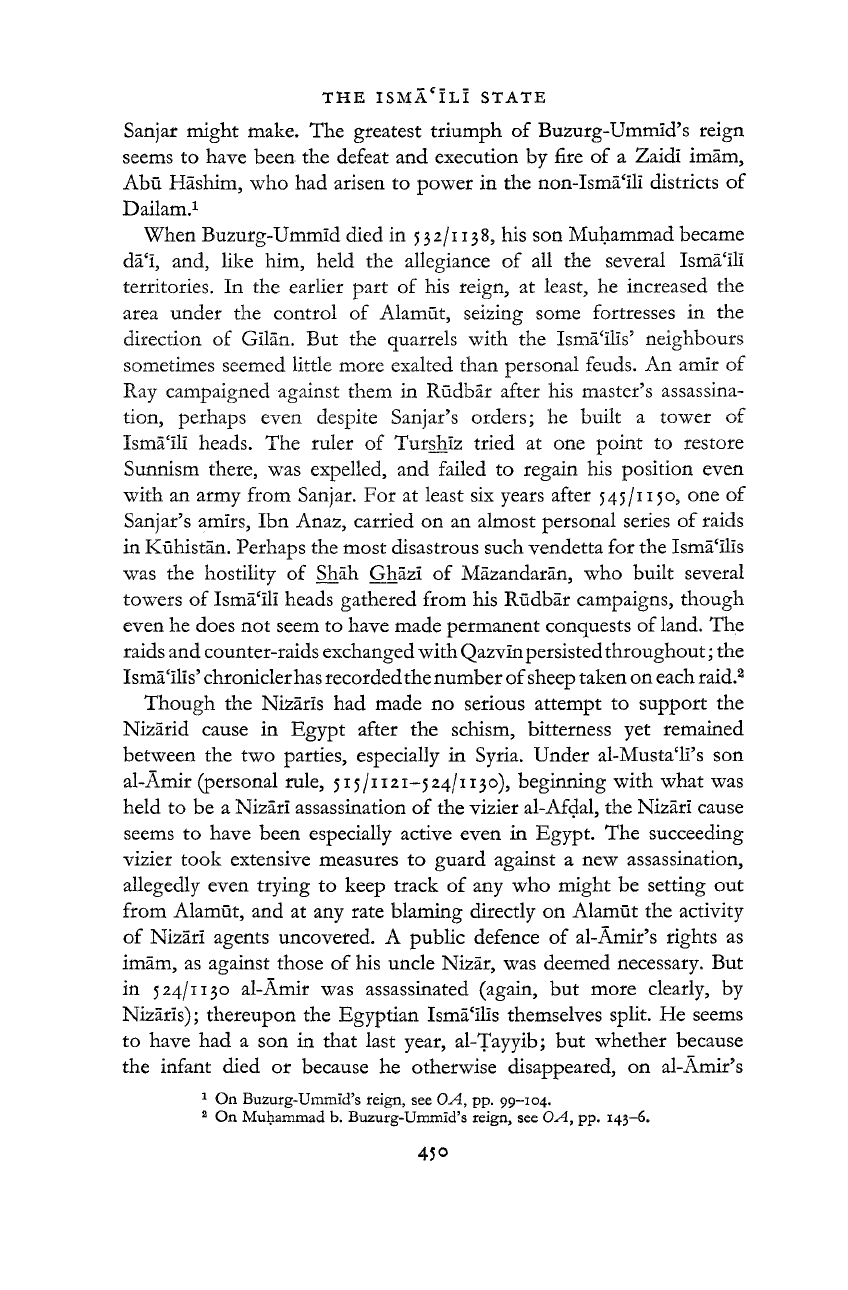
THE
ISMA
C
ILI
STATE
450
Sanjar might make. The greatest triumph of Buzurg-Ummid's reign
seems to have been the defeat and execution by fire of a Zaidi imam,
Abu
Hashim, who had arisen to power in the non-lsma'lll districts of
Dailam.
1
When
Buzurg-Ummid died in
532/1138,
his son Muhammad became
da'I,
and, like him, held the allegiance of all the several Isma'ili
territories. In the earlier
part
of his reign, at least, he increased the
area under the control of Alamut, seizing some fortresses in the
direction of Gilan. But the quarrels with the Isma'Ilis' neighbours
sometimes seemed little more exalted
than
personal feuds. An amir of
Ray
campaigned against them in Rudbar after his master's
assassina-
tion, perhaps even despite Sanjar's orders; he built a
tower
of
Isma'ili heads. The ruler of Turshiz tried at one point to restore
Sunnism there, was expelled, and failed to regain his position even
with
an army from Sanjar. For at least six years after
545/1150,
one of
Sanjar's amirs, Ibn
Anaz,
carried on an almost personal series of raids
in Kuhistan. Perhaps the most disastrous such vendetta for the Isma'Ilis
was
the hostility of Shah Ghazi of Mazandaran, who built several
towers of Isma'ili heads gathered from his Rudbar campaigns, though
even
he does not seem to have made permanent conquests of land. The
raids and counter-raids exchanged with
Qazvln
persisted throughout; the
Isma'Ilis'
chronicler has recorded the number
of
sheep taken on each raid.
2
Though
the Nizarls had made no serious
attempt
to support the
Nizarid
cause in Egypt after the schism, bitterness yet remained
between
the two parties, especially in Syria. Under al-Musta'li's son
al-Amir
(personal rule,
515/1121-524/1130),
beginning with what was
held to be a Nizarl assassination of the
vizier
al-Afdal,
the Nizarl cause
seems to have been especially active even in Egypt. The succeeding
vizier
took extensive measures to guard against a new assassination,
allegedly
even trying to keep track of any who might be setting out
from Alamut, and at any
rate
blaming directly on Alamut the activity
of
Nizarl agents uncovered. A public defence of al-Amir's rights as
imam, as against those of his uncle Nizar, was deemed necessary. But
in
524/1130
al-Amir was assassinated (again, but more clearly, by
Nizarls);
thereupon the Egyptian Isma'Ilis themselves split. He seems
to have had a son in
that
last year,
al-Tayyib;
but whether because
the infant died or because he otherwise disappeared, on al-Amir's
1
On
Buzurg-Ummid's
feign,
see OA, pp.
99-104.
2
On Muhammad b.
Buzurg-Ummid's
reign, see OA, pp.
143-6.
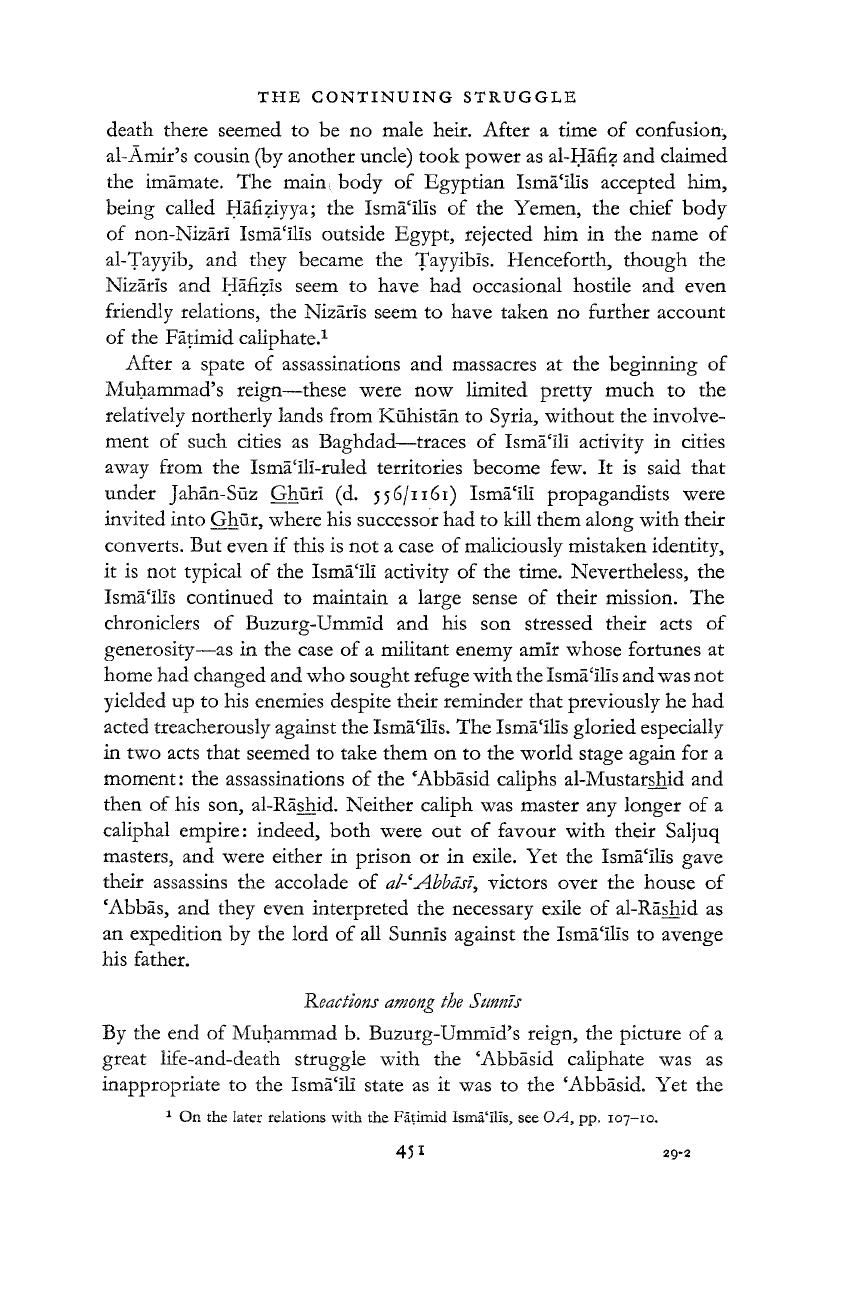
THE
CONTINUING
STRUGGLE
death
there
seemed to be no male heir. After a time of confusion,
al-Amir's
cousin (by another uncle) took power as al-Hafiz and claimed
the imamate. The main body of Egyptian Isma'ilis accepted him,
being
called Hafiziyya; the Isma'ilis of the
Yemen,
the
chief
body
of
non-Nizari Isma'ilis outside Egypt, rejected him in the name of
al-Tayyib,
and they became the
Tayyibis.
Henceforth, though the
Nizaris
and Hafizis seem to have had occasional hostile and even
friendly
relations, the Nizaris seem to have taken no further account
of
the Fatimid caliphate.
1
After
a spate of assassinations and massacres at the beginning of
Muhammad's reign—these were now limited pretty much to the
relatively
northerly lands from Kuhistan to Syria, without the involve-
ment of such cities as Baghdad—traces of Isma'ili activity in cities
away
from the Isma'ili-ruled territories become few. It is said
that
under
Jahan-Suz Ghuri (d.
556/1161)
Isma'ili propagandists were
invited
into Ghur, where his successor had to
kill
them along with their
converts.
But even if this is not a case of
maliciously
mistaken identity,
it is not typical of the Isma'ili activity of the time. Nevertheless, the
Isma'ilis continued to maintain a large sense of their mission. The
chroniclers of Buzurg-Ummid and his son stressed their acts of
generosity—as
in the case of a militant enemy amir whose fortunes at
home had changed and who sought refuge with the Isma'ilis and
was
not
yielded
up to his enemies despite their reminder
that
previously he had
acted treacherously against the Isma'ilis. The Isma'ilis gloried especially
in two acts
that
seemed to take them on to the world stage again for a
moment: the assassinations of the 'Abbasid caliphs al-Mustarshid and
then
of his son, al-Rashid. Neither caliph was master any longer of a
caliphal
empire: indeed, both were out of favour with their Saljuq
masters, and were either in prison or in
exile.
Yet the Isma'ilis gave
their assassins the accolade of al-
c
Abbasi, victors over the house of
'Abbas,
and they even interpreted the necessary exile of al-Rashid as
an expedition by the lord of all Sunnis against the Isma'ilis to avenge
his father.
Reactions
among
the Sunnis
By
the end of Muhammad b. Buzurg-Ummid's reign, the picture of a
great life-and-death struggle with the 'Abbasid caliphate was as
inappropriate to the Isma'ili
state
as it was to the 'Abbasid. Yet the
1
On the
later
relations
with the Fatimid Isma'ilis, see OA, pp.
107-10.
451
29-2
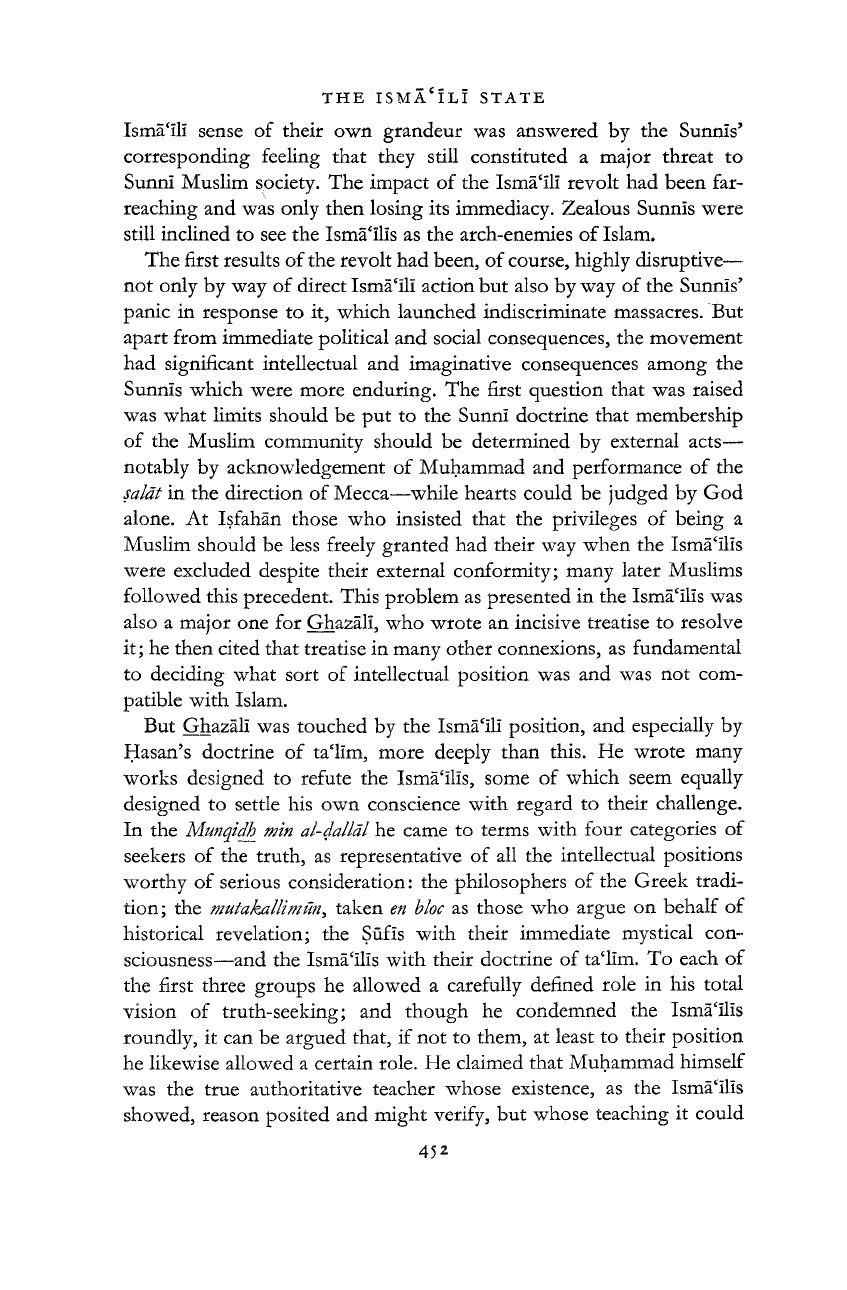
THE
ISMA'ILI
STATE
452
Isma'ili sense of their own grandeur was answered by the Sunnis'
corresponding feeling
that
they still constituted a major
threat
to
Sunni Muslim society. The impact of the Isma'ili revolt had been far-
reaching and was only
then
losing its immediacy. Zealous Sunnis were
still
inclined to see the Isma'llis as the arch-enemies of Islam.
The
first results of the revolt had been, of
course,
highly disruptive—
not only by way of direct Isma'ili action but also by way of the Sunnis'
panic in response to it, which launched indiscriminate massacres. But
apart
from immediate political and social consequences, the movement
had significant intellectual and imaginative consequences among the
Sunnis which were more enduring. The first question
that
was raised
was
what limits should be put to the Sunni doctrine
that
membership
of
the Muslim community should be determined by external acts—
notably by acknowledgement of Muhammad and performance of the
saldt in the direction of
Mecca—while
hearts
could be judged by God
alone.
At Isfahan those who insisted
that
the privileges of being a
Muslim
should be less freely granted had their way when the Isma'llis
were
excluded despite their external conformity; many later Muslims
followed
this precedent. This problem as presented in the Isma'ills was
also
a major one for Ghazali, who wrote an incisive treatise to resolve
it; he
then
cited
that
treatise in many other connexions, as fundamental
to deciding what sort of intellectual position was and was not com-
patible with Islam.
But
Ghazali was touched by the
Isma'111
position, and especially by
Hasan's doctrine of ta'lim, more deeply
than
this. He wrote many
works
designed to refute the Isma'ills, some of which seem equally
designed
to settle his own conscience with regard to their challenge.
In the Munqidh min al-dalldl he came to
terms
with four categories of
seekers of the
truth,
as representative of all the intellectual positions
worthy
of serious consideration: the philosophers of the Greek tradi-
tion; the
mutakallimun^
taken en
bloc
as those who argue on behalf of
historical revelation; the Sufis with their immediate mystical con-
sciousness—and the Isma'llis with their doctrine of ta'lim. To each of
the first
three
groups he allowed a carefully defined role in his total
vision
of truth-seeking; and though he condemned the Isma'llis
roundly, it can be argued
that,
if not to them, at least to their position
he likewise allowed a certain role. He claimed
that
Muhammad himself
was
the
true
authoritative teacher whose existence, as the Isma'llis
showed,
reason posited and might verify, but whose teaching it could
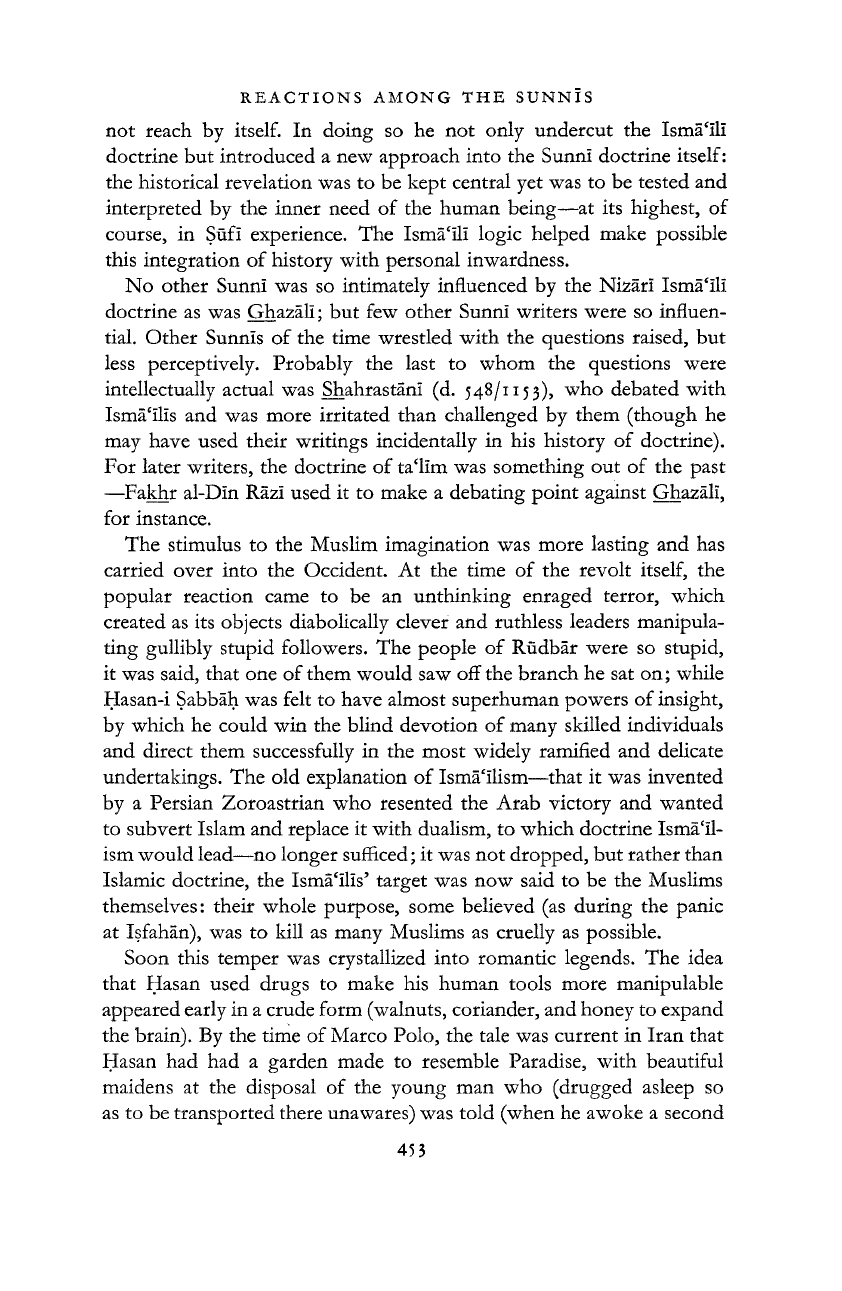
REACTIONS
AMONG
THE
SUNNIS
not reach by itself. In doing so he not only undercut the Isma'ili
doctrine but introduced a new approach into the Sunni doctrine itself:
the historical revelation was to be kept central yet was to be tested and
interpreted
by the inner need of the human being—at its highest, of
course,
in
Sufi
experience. The Isma'ili
logic
helped make possible
this integration of history with personal inwardness.
No
other Sunni was so intimately influenced by the Nizari Isma'ili
doctrine as was Ghazali; but few other Sunni writers were so influen-
tial.
Other Sunnis of the time wrestled with the questions raised, but
less
perceptively. Probably the last to whom the questions were
intellectually
actual was Shahrastani (d.
548/1153),
who debated with
Isma'ilis and was more
irritated
than
challenged by them (though he
may
have used their writings incidentally in his history of doctrine).
For later writers, the doctrine of ta'lim was something out of the past
—Fakhr al-Din
Razi
used it to make a debating point against Ghazali,
for
instance.
The
stimulus to the Muslim imagination was more lasting and has
carried over into the Occident. At the time of the revolt itself, the
popular reaction came to be an unthinking enraged
terror,
which
created as its objects diabolically clever and ruthless leaders manipula-
ting gullibly stupid
followers.
The people of Rudbar were so stupid,
it was said,
that
one of them would saw off the branch he sat on; while
Hasan-i Sabbah was felt to have almost superhuman powers of insight,
by
which he could win the blind devotion of many skilled individuals
and direct them successfully in the most
widely
ramified and delicate
undertakings. The old explanation of Isma'ilism—that it was invented
by
a Persian Zoroastrian who resented the Arab victory and wanted
to subvert Islam and replace it with dualism, to which doctrine Isma'il-
ism
would lead—no longer sufficed; it was not dropped, but
rather
than
Islamic doctrine, the Isma'ilis' target was now said to be the Muslims
themselves:
their whole purpose, some believed (as during the panic
at Isfahan), was to
kill
as many Muslims as cruelly as possible.
Soon
this temper was crystallized into romantic legends. The idea
that
Hasan used drugs to make his human tools more manipulable
appeared early in a crude form (walnuts, coriander, and honey to expand
the brain). By the time of Marco
Polo,
the tale was
current
in
Iran
that
Hasan had had a garden made to resemble Paradise, with beautiful
maidens at the disposal of the young man who (drugged asleep so
as to be
transported
there
unawares) was told (when he awoke a second
45
3
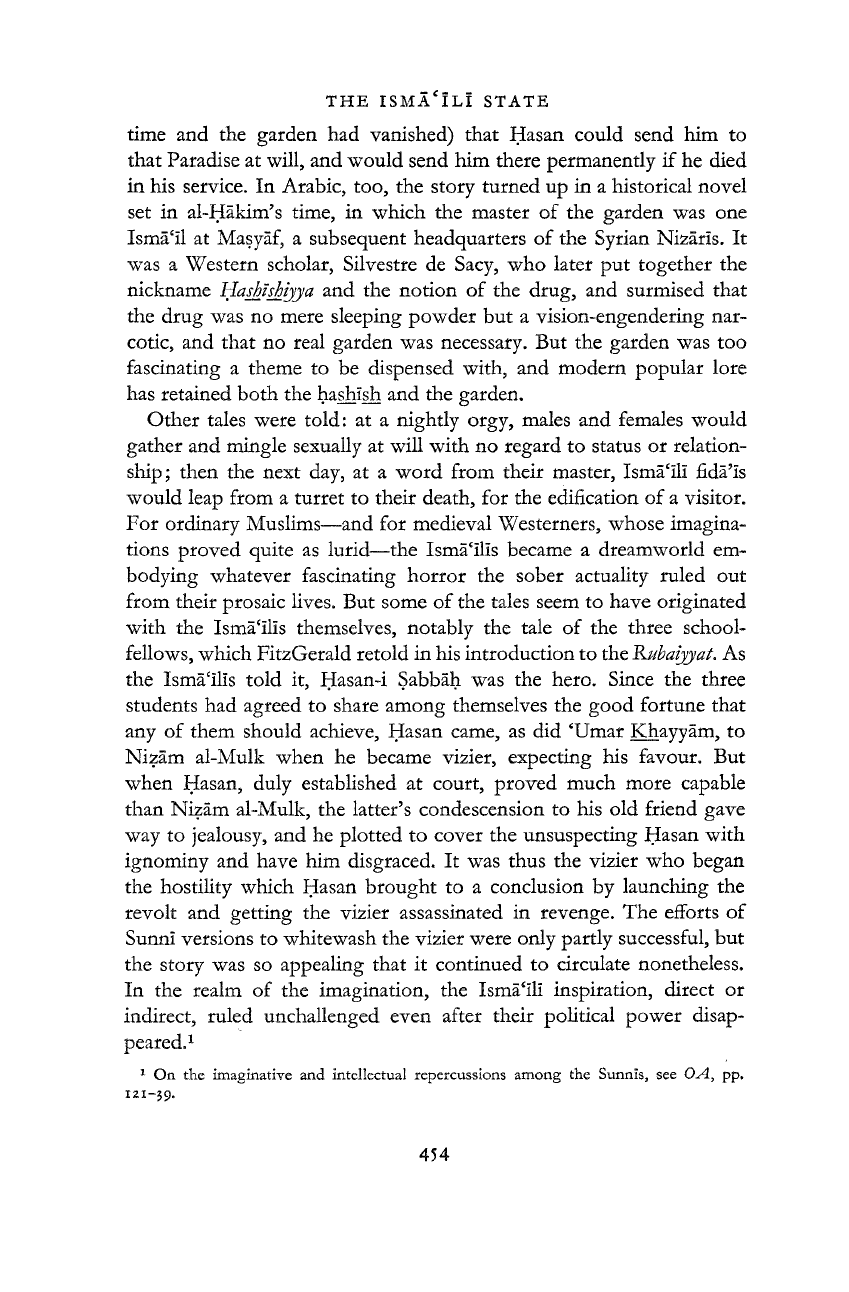
THE
ISMA'ILI
STATE
454
time and the garden had vanished)
that
Hasan could send him to
that
Paradise at
will,
and would send him
there
permanently if he died
in his service. In Arabic, too, the story
turned
up in a historical novel
set in al-Hakim's time, in which the master of the garden was one
Isma'il at Masyaf, a subsequent headquarters of the Syrian Nizaris. It
was
a Western scholar, Silvestre de
Sacy,
who later put together the
nickname Hashishiyya and the notion of the drug, and surmised
that
the drug was no mere sleeping powder but a vision-engendering
nar-
cotic,
and
that
no real garden was necessary. But the garden was too
fascinating
a theme to be dispensed with, and modern popular lore
has retained both the hashish and the garden.
Other tales were told: at a nightly orgy, males and females would
gather and mingle sexually at
will
with no regard to
status
or relation-
ship;
then
the next day, at a word from their master, Isma'ili fida'is
would
leap from a
turret
to their death, for the edification of a visitor.
For ordinary Muslims—and for medieval Westerners, whose imagina-
tions proved quite as lurid—the Isma'ilis became a dreamworld em-
bodying
whatever fascinating
horror
the sober actuality ruled out
from
their prosaic
lives.
But some of the tales seem to have originated
with
the Isma'ilis themselves, notably the tale of the
three
school-
fellows,
which FitzGerald retold in his introduction to the
Rubaiyyat.
As
the Isma'ilis told it, Hasan-i Sabbah was the hero. Since the
three
students
had agreed to
share
among themselves the good fortune
that
any of them should achieve, Hasan came, as did 'Umar
Khayyam,
to
Nizam
al-Mulk when he became
vizier,
expecting his favour. But
when
Hasan, duly established at court, proved much more capable
than
Nizam al-Mulk, the latter's condescension to his old friend
gave
way
to jealousy, and he plotted to cover the unsuspecting Hasan with
ignominy
and have him disgraced. It was
thus
the
vizier
who began
the hostility which Hasan brought to a conclusion by launching the
revolt
and getting the
vizier
assassinated in revenge. The efforts of
Sunnl versions to whitewash the
vizier
were only partly successful, but
the story was so appealing
that
it continued to circulate nonetheless.
In the realm of the imagination, the Isma'ili inspiration, direct or
indirect, ruled unchallenged even after their political power disap-
peared.
1
1
On the imaginative and intellectual repercussions among the Sunnis, see OA, pp.
121-39.
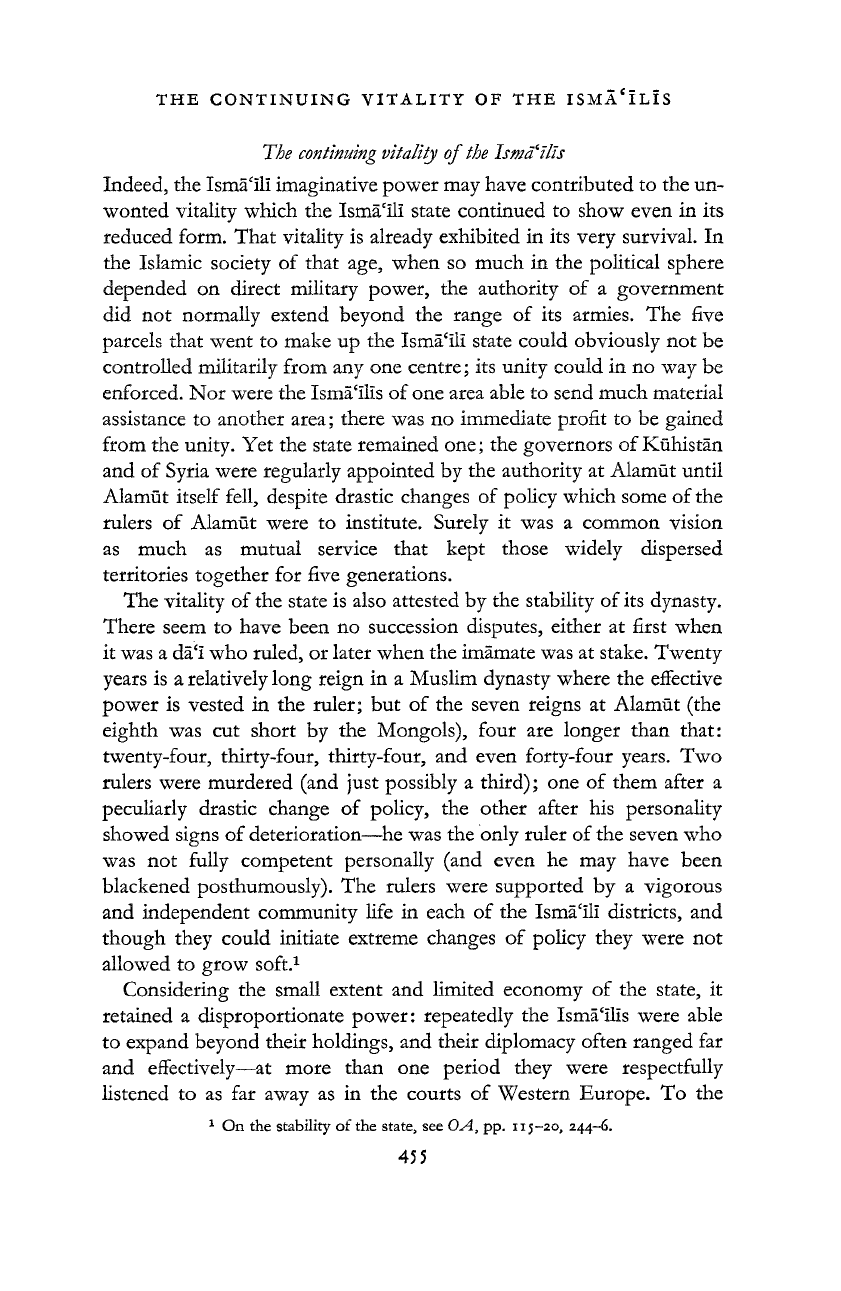
THE CONTINUING
VITALITY
OF THE ISMA
C
ILIS
The
continuing
vitality
of
the
Ismcfilis
Indeed, the Isma'ili imaginative power may have contributed to the un-
wonted vitality which the Isma'ili
state
continued to show even in its
reduced form. That vitality is already exhibited in its very survival. In
the Islamic society of
that
age, when so much in the political sphere
depended on direct military power, the authority of a government
did not normally extend beyond the range of its armies. The
five
parcels
that
went to make up the Isma'ili
state
could obviously not be
controlled militarily from any one centre; its unity could in no way be
enforced. Nor were the Isma'ilis of one area able to send much material
assistance to another area;
there
was no immediate profit to be gained
from the unity. Yet the
state
remained one; the governors of Kuhistan
and of Syria were regularly appointed by the authority at Alamut until
Alamut
itself
fell,
despite drastic changes of policy which some of the
rulers of Alamut were to institute. Surely it was a common vision
as much as mutual service
that
kept those widely dispersed
territories together for
five
generations.
The
vitality of the
state
is also attested by the stability of its dynasty.
There seem to have been no succession disputes, either at first when
it was a da'i who ruled, or later when the imamate was at stake. Twenty
years is a relatively long reign in a Muslim dynasty where the effective
power
is vested in the ruler; but of the seven reigns at Alamut (the
eighth was cut short by the Mongols), four are longer
than
that:
twenty-four, thirty-four, thirty-four, and even forty-four years. Two
rulers were murdered (and just possibly a third); one of them after a
peculiarly
drastic change of policy, the other after his personality
showed
signs of deterioration—he was the only ruler of the seven who
was
not fully competent personally (and even he may have been
blackened posthumously). The rulers were supported by a vigorous
and independent community
life
in each of the Isma'ili districts, and
though they could initiate extreme changes of policy they were not
allowed
to grow soft.
1
Considering the small extent and limited economy of the state, it
retained a disproportionate power: repeatedly the Isma'ilis were able
to expand beyond their holdings, and their diplomacy often ranged far
and effectively—at more
than
one period they were respectfully
listened to as far away as in the courts of Western Europe. To the
1
On the stability
of
the
state,
see OA,
pp.
115-20,
244-6.
455
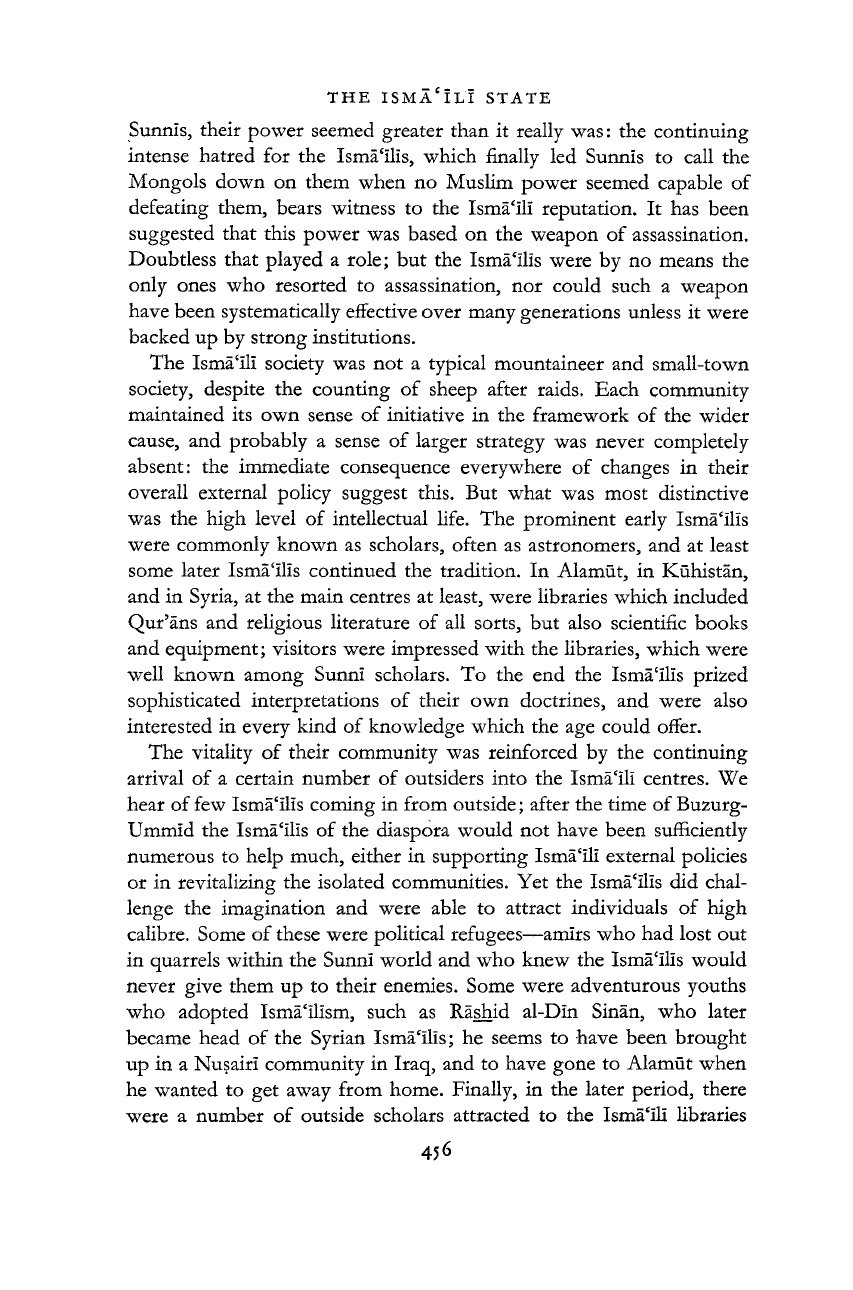
THE
ISMA'ÍLÍ
STATE
456
Sunnis, their power seemed greater
than
it really was: the continuing
intense
hatred
for the Ismá'ílis, which finally led Sunnis to
call
the
Mongols
down on them when no Muslim power seemed capable of
defeating them, bears witness to the
Ismá'íli reputation. It has been
suggested
that
this power was based on the weapon of assassination.
Doubtless
that
played a role; but the Ismá'ílis were by no means the
only
ones who resorted to assassination, nor could such a weapon
have been systematically
effective
over many generations unless it were
backed
up by strong institutions.
The
Ismá'íll society was not a typical mountaineer and small-town
society,
despite the counting of sheep after raids. Each community
maintained its own sense of initiative in the framework of the wider
cause,
and probably a sense of larger strategy was never completely
absent: the immediate consequence everywhere of changes in their
overall
external policy suggest this. But what was most distinctive
was
the high
level
of intellectual
life.
The prominent early Ismá'ílis
were commonly known as scholars, often as astronomers, and at least
some later
Ismá'ílis continued the tradition. In Alamüt, in Kühistán,
and in Syria, at the main centres at least, were libraries which included
Qur'áns and religious
literature
of all sorts, but also scientific books
and equipment; visitors were impressed with the libraries, which were
well
known among SunnI scholars. To the end the Ismá'ílis prized
sophisticated
interpretations
of their own doctrines, and were also
interested in every kind of knowledge which the age could offer.
The
vitality of their community was reinforced by the continuing
arrival of a certain number of outsiders into the
Ismá'íll centres. We
hear of few
Ismá'ílis coming in from outside; after the time of Buzurg-
Ummid the
Ismá'ílis of the diaspora would not have been sufficiently
numerous to help much, either in supporting
Ismá'ilí external policies
or in revitalizing the isolated communities. Yet the
Ismá'ílis did chal-
lenge
the imagination and were able to
attract
individuals of high
calibre.
Some of these were political refugees—amirs who had lost out
in quarrels within the SunnI world and who knew the
Ismá'ílis would
never
give
them up to their enemies. Some were adventurous youths
who
adopted Ismá'illsm, such as Ráshid ai-Din Sinán, who later
became head of the Syrian
Ismá'ílis; he seems to have been brought
up in a Nusairi community in
Iraq,
and to have gone to Alamüt when
he wanted to get away from home. Finally, in the later period,
there
were a number of outside scholars
attracted
to the Ismá'íll libraries
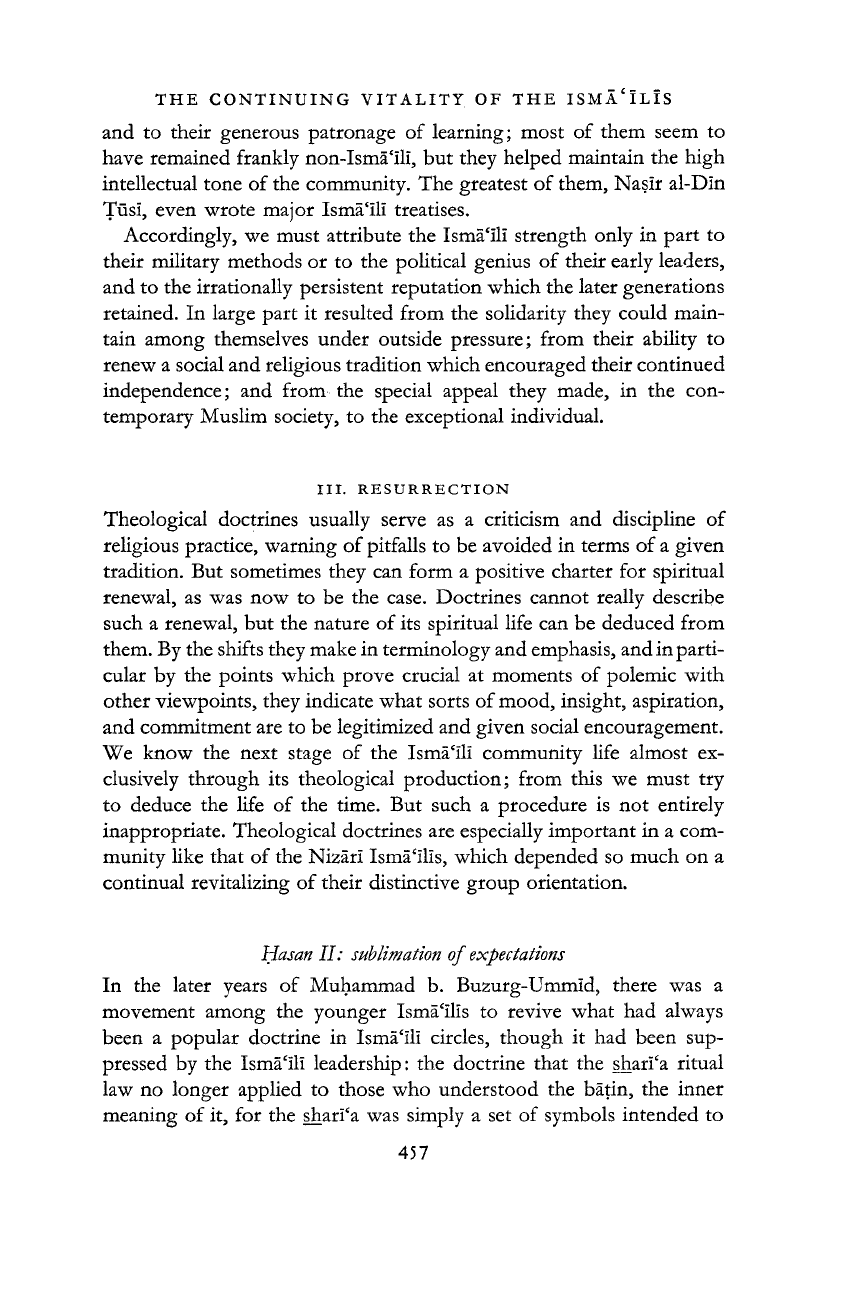
THE
CONTINUING
VITALITY
OF THE ISMA'ILIS
and to their generous patronage of learning; most of them seem to
have
remained frankly non-Isma'ili, but they helped maintain the high
intellectual tone of the community. The greatest of them, Nasir al-Din
Tusi,
even wrote major Isma'ili treatises.
Accordingly,
we must
attribute
the Isma'ili strength only in
part
to
their military methods or to the political genius of their early leaders,
and to the irrationally persistent reputation which the later generations
retained. In large
part
it resulted from the solidarity they could main-
tain among themselves
under
outside pressure; from their ability to
renew a social and religious tradition which encouraged their continued
independence; and from the special appeal they made, in the con-
temporary Muslim society, to the exceptional individual.
III.
RESURRECTION
Theological
doctrines usually serve as a criticism and discipline of
religious
practice, warning of pitfalls to be avoided in
terms
of a
given
tradition. But sometimes they can form a positive charter for spiritual
renewal,
as was now to be the case. Doctrines cannot really describe
such a renewal, but the
nature
of its spiritual
life
can be deduced from
them. By the shifts they make in terminology and emphasis, and in parti-
cular by the points which prove crucial at moments of polemic with
other viewpoints, they indicate what sorts of mood, insight, aspiration,
and commitment are to be legitimized and
given
social encouragement.
We
know the next stage of the Isma'ili community
life
almost ex-
clusively
through its theological production; from this we must try
to deduce the
life
of the time. But such a procedure is not entirely
inappropriate. Theological doctrines are especially important in a com-
munity like
that
of the Nizari Isma'ilis, which depended so much on a
continual revitalizing of their distinctive group orientation.
Hasan II:
sublimation
of
expectations
In the later years of Muhammad b. Buzurg-Ummid,
there
was a
movement among the younger Isma'ilis to revive what had always
been a popular doctrine in Isma'ili circles, though it had been sup-
pressed by the Isma'ili leadership: the doctrine
that
the shari'a ritual
law
no longer applied to those who understood the batin, the inner
meaning of it, for the shari'a was simply a set of symbols intended to
457
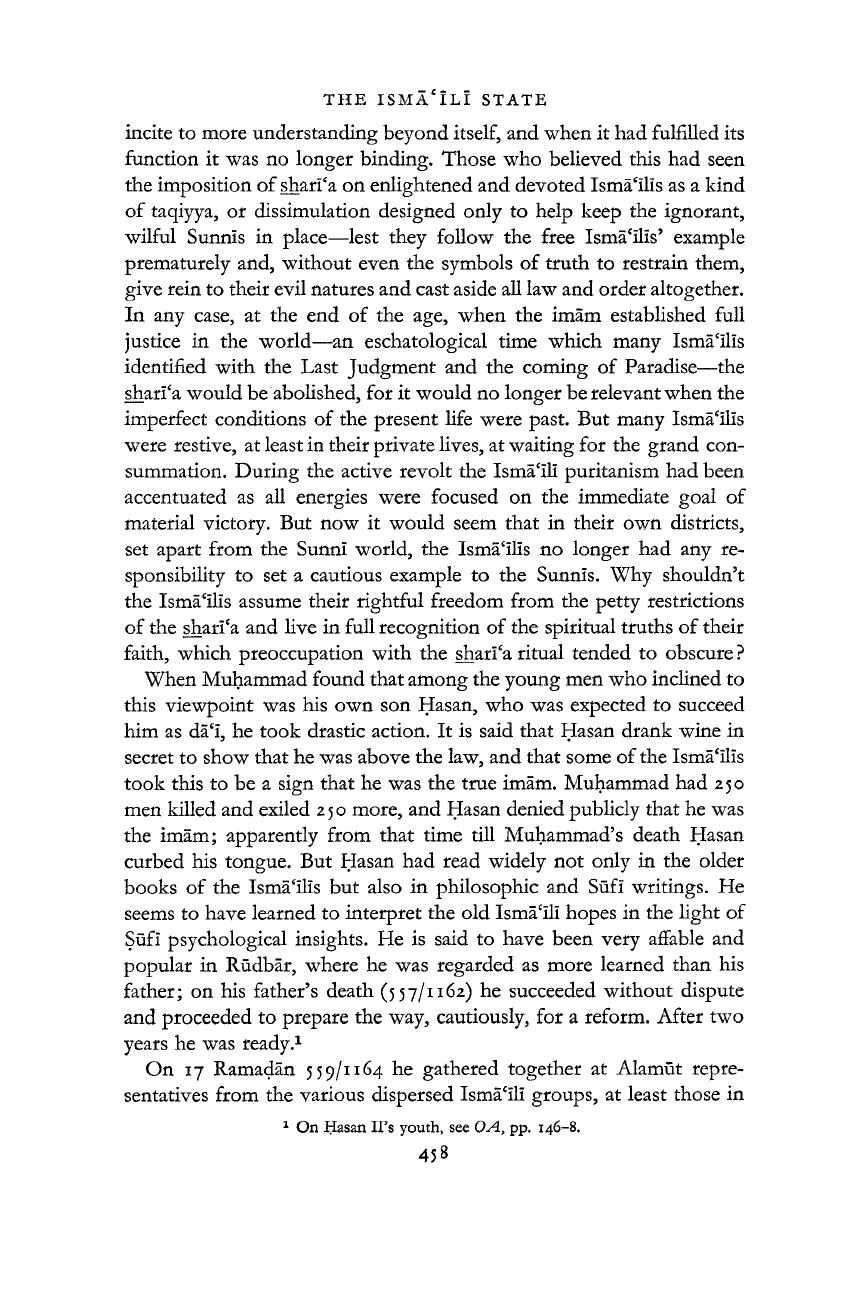
THE
ISMA'ILI
STATE
incite to more understanding beyond itself, and when it had
fulfilled
its
function it was no longer binding. Those who believed this had seen
the imposition of shari'a on enlightened and devoted Isma'llls as a kind
of
taqiyya, or dissimulation designed only to help keep the ignorant,
wilful
Sunnis in place—lest they
follow
the free Isma'llls' example
prematurely and, without even the symbols of
truth
to restrain them,
give
rein to their
evil
natures
and cast aside all law and order altogether.
In any case, at the end of the age, when the imam established
full
justice in the world—an eschatological time which many Isma'llls
identified with the Last Judgment and the coming of Paradise—the
shari'a would be abolished, for it would no longer be relevant when the
imperfect conditions of the present
life
were past. But many Isma'llls
were restive, at least in their private
lives,
at waiting for the grand con-
summation. During the active revolt the Isma'llI puritanism had been
accentuated as all energies were focused on the immediate goal of
material victory. But now it would seem
that
in their own districts,
set
apart
from the SunnI world, the Isma'llls no longer had any re-
sponsibility to set a cautious example to the Sunnis. Why shouldn't
the Isma'llls assume their rightful freedom from the petty restrictions
of
the shari'a and
live
in
full
recognition of the spiritual
truths
of their
faith, which preoccupation with the shari'a ritual tended to obscure ?
When Muhammad found
that
among the young men who inclined to
this viewpoint was his own son Hasan, who was expected to succeed
him as da'I, he took drastic action. It is said
that
Hasan drank wine in
secret to show
that
he was above the law, and
that
some of the Isma'llls
took this to be a sign
that
he was the
true
imam. Muhammad had 250
men killed and exiled 250 more, and Hasan denied publicly
that
he was
the imam; apparently from
that
time till Muhammad's death Hasan
curbed his tongue. But Hasan had read
widely
not only in the older
books
of the Isma'llls but also in philosophic and
Sufi
writings. He
seems to have learned to interpret the old Isma'llI hopes in the light of
Sufi
psychological insights. He is said to have been very affable and
popular in Rudbar, where he was regarded as more learned
than
his
father; on his father's death
(557/1162)
he succeeded without dispute
and proceeded to prepare the way, cautiously, for a reform.
After
two
years he was ready.
1
On
17 Ramadan
559/1164
he gathered together at Alamut repre-
sentatives from the various dispersed Isma'llI groups, at least those in
1
On liasan IFs youth, see OA, pp.
146-8.
458
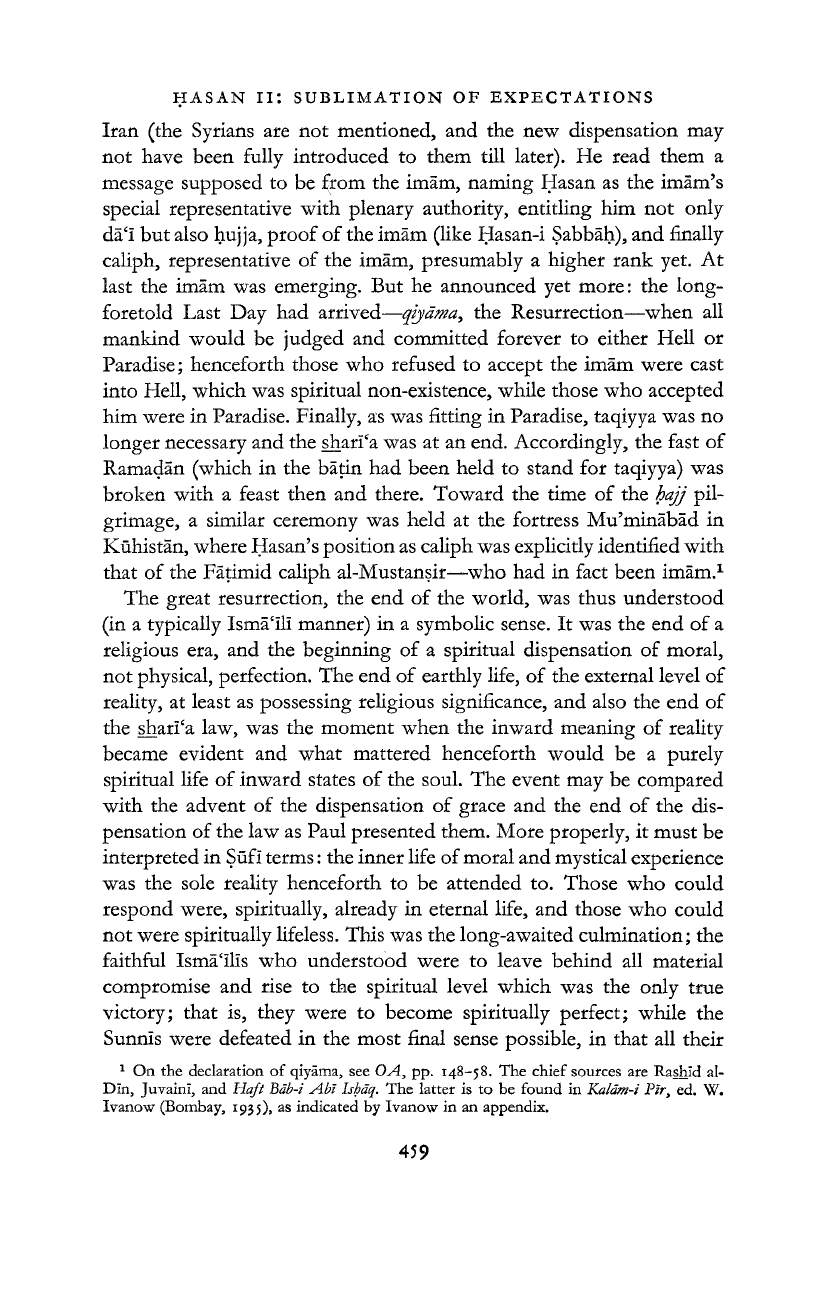
HASAN
II:
SUBLIMATION
OF EXPECTATIONS
Iran
(the Syrians are not mentioned, and the new dispensation may
not have been fully introduced to them till later). He read them a
message
supposed to be from the imam, naming Hasan as the imam's
special
representative with plenary authority, entitling him not only
da'I but also hujja, proof of the imam (like Hasan-i Sabbah), and finally
caliph,
representative of the imam, presumably a higher
rank
yet. At
last the imam was emerging. But he announced yet more: the long-
foretold
Last Day had arrived—qiydma
y
the Resurrection—when all
mankind would be judged and committed forever to either Hell or
Paradise; henceforth those who refused to accept the imam were cast
into Hell, which was spiritual non-existence, while those who accepted
him were in Paradise. Finally, as was fitting in Paradise, taqiyya was no
longer
necessary and the sharfa was at an end.
Accordingly,
the fast of
Ramadan (which in the batin had been held to
stand
for taqiyya) was
broken with a feast
then
and there. Toward the time of the hajj pil-
grimage,
a similar ceremony was held at the fortress Mu'minabad in
Kuhistan, where Hasan's position as caliph was
explicitly
identified with
that
of the Fatimid caliph al-Mustansir—who had in fact been imam.
1
The
great resurrection, the end of the world, was
thus
understood
(in a typically Isma'lU manner) in a symbolic sense. It was the end of a
religious
era, and the beginning of a spiritual dispensation of moral,
not
physical,
perfection. The end of earthly
life,
of the external
level
of
reality, at least as possessing religious significance, and also the end of
the sharfa law, was the moment when the inward meaning of reality
became evident and what mattered henceforth would be a purely
spiritual
life
of inward states of the soul. The event may be compared
with
the advent of the dispensation of grace and the end of the dis-
pensation of the law as Paul presented them. More properly, it must be
interpreted in Sufi terms: the inner
life
of
moral and mystical experience
was
the sole reality henceforth to be attended to. Those who could
respond were, spiritually, already in eternal
life,
and those who could
not were spiritually
lifeless.
This was the long-awaited culmination; the
faithful
Isma'llls who understood were to leave behind all material
compromise and rise to the spiritual
level
which was the only
true
victory;
that
is, they were to become spiritually perfect; while the
Sunnis were defeated in the most final sense possible, in
that
all their
1
On the declaration of qiyama, see OA, pp.
148-58.
The chief sources are Rashid al-
Din,
Juvaini,
and
Haft
Bdb-i Abi Ishaq. The
latter
is to be
found
in Kalam-i P/r, ed. W.
Ivanow (Bombay,
1935),
as indicated by Ivanow in an appendix.
459
